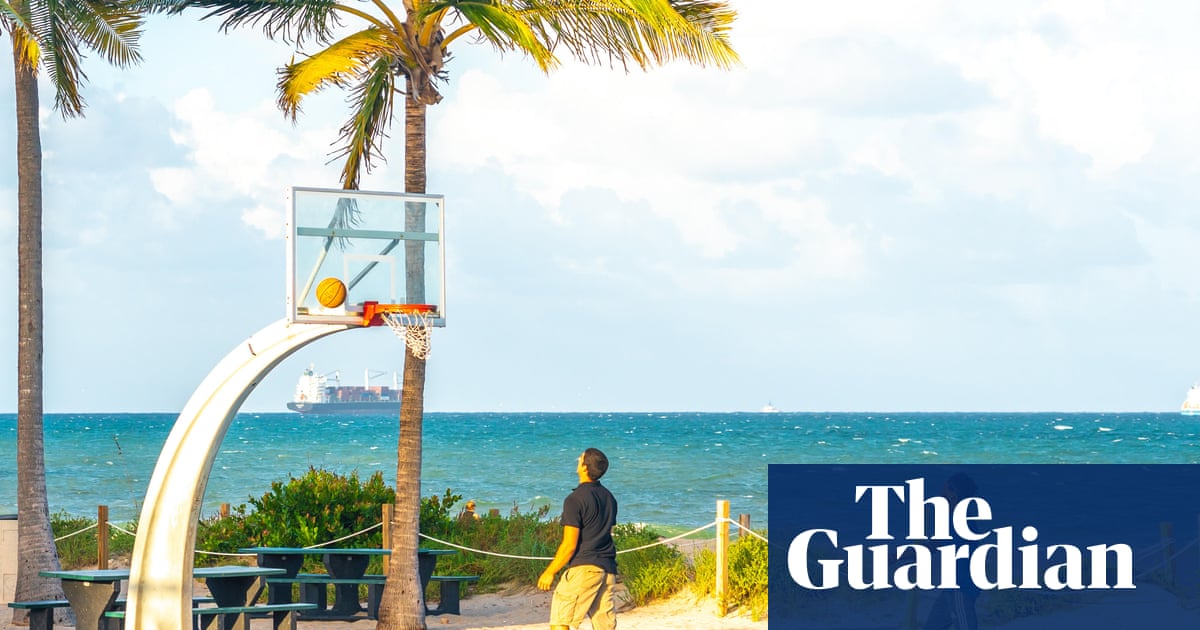A proposal to rip out decades-old public basketball courts on Fort Lauderdale’s historic beachfront and replace them with new pickleball facilities has enraged residents, and prompted some to suggest an underlying racial motive.
The two oceanside courts were built within 10 years of a landmark 1962 judicial ruling thatended segregationon the Florida city’s beaches. They have remained popular with a diverse crowd of players and spectators since.
The Fort Lauderdale city commission and developers signed an agreement last year for a glitzy $2bn makeover of the old Bahia Mar marina and surrounding acreage that will turn the area into a “mini Monaco” with a luxury hotel, high-end residences, upmarket shopping and waterfront promenade.
But while protesters acknowledge the addition of pickleball courts was mentioned in the agreement, they insist it was never specified that the basketball courts would be torn up to accommodate them.
They fear that a conversion to pickleball will destroy the community tradition that basketball has provided at the site for generations; they also say the courts are packed every weekend with players of all ages and racial backgrounds, many traveling with their families to join in.
“These courts are in a pretty wealthy area, you’re talking homes up to $50m, $60m, then you have the district west of the city that’s predominantly minorities, many Black residents live there,” said Leo Lorenz, co-founder of theFort Lauderdale Beach Ballersgroup whosepreserve the courts petitionon change.org has thousands of signatures so far.
“A lot of the people that come to the courts all live to the western side. If they don’t have a car, they’ll take a bus. Some ride their bicycles, and they all come on the weekends to play.
“I’ve lived here for 35 years, I’m on the courts three times a week, and I’ve met so many wonderful people out there over the years. I think that we, the people who go there and use them every day, have a better understanding of what these courts represent than the commissioners. They don’t use it, so they don’t know.”
The campaigners concede that some elements of the development represent a welcome, ongoing revitalization of an older section of the city. That area began as a 19th-century US army fort, and later became the permanent home of the Fort Lauderdale international boat show, one of the world’s largest.
However, they say surrendering the basketball courts is unacceptable. Some have even taken to social media to express their opposition.
Mari Bacon, a Fort Lauderdale realtor, suggested in apost to Facebookthat the city wanted only its version of “acceptable” residents to enjoy the beach.
“I would hate to think erasing the basketball courts would be an effort on the part of the commissioners to ‘whiten’ that section of the beach,” she wrote.
“We are all welcome on Fort Lauderdale beaches, and an especially loved area are the picnic tables and basketball courts.”
Under the terms of the agreement the city commission signed last year with developers Rahn Bahia Mar llc, an affiliate of Tate Capital of Miami, a $1m public improvement fund would be set up for enhancements – including the installation of pickleball courts.
But Lorenz said that the first players knew that pickleball would replace the basketball courts, instead ofsupplementingthem, was when city workers erected a sign.
The sign, put up last month, said that the conversion was “coming soon” and provided a telephone number for questions. The sign has since been removed.
Lorenz was among the campaigners who attended a meeting of the Fort Lauderdale commission on Tuesday, at which he said one commissioner, Pamela Beasley-Pittman, expressed a desire to keep the basketball courts open and upgrade them.
He said Beasley-Pittman conceded she originally voted for the development while also being unaware it meant their closure. She did not return a request for comment from the Guardian.
Fort Lauderdale’s mayor, Dean Trantalis,told the Sun-Sentinel newspaperthat he was keen to explore options for preservation or relocation.
“I don’t want to displace basketball from the beach, whether it stays where it is or moves over to another location,” he said. “There is a solution there and we will find it. It doesn’t have to be a public debate. We hear the community and we will respond.”
James Tate, co-owner and president of Tate Capital, told the Guardian in a written response that “this entire situation and how it has unfolded is unfortunate and incredibly disheartening”, and that the pickleball courts were openly discussed and the development unanimously approved by commissioners more than 15 months ago.
“The reason pickleball was chosen over basketball was simple. At the time these negotiations were being had, pickleball was the fastest-growing sport in the country [and] the range of players extended from young children to older adults, whereas a vast majority of basketball players are teenagers and young adults,” he said.
“In short, it was determined by everyone involved in the process that the broad appeal of pickleball would reach a lot more Fort Lauderdale residents than basketball. Plain and simple, nothing nefarious.”
Tate said protesters using race as an argument to preserve the basketball courts were creating a false narrative and “selfishly trying to divide a great city”. The Guardian’s question about it was “irresponsible”, he added.
“The people who play basketball and people who play pickleball are all the same in my book. [Protesters] who are trying to insinuate that one sport is only played by one race, that is absurd,” he said.
“I love basketball. I played basketball my entire childhood. I admire those who can still play.”
Tate said it would be impossible to change the agreement for the pickleball courts, but that the development board set up to oversee the project recognized many people still wanted to play basketball on the beach, and had “offered a suggestion to the city which they are now exploring, with diligence”.
“If things work out as suggested, then everyone should be happy,” he said.
